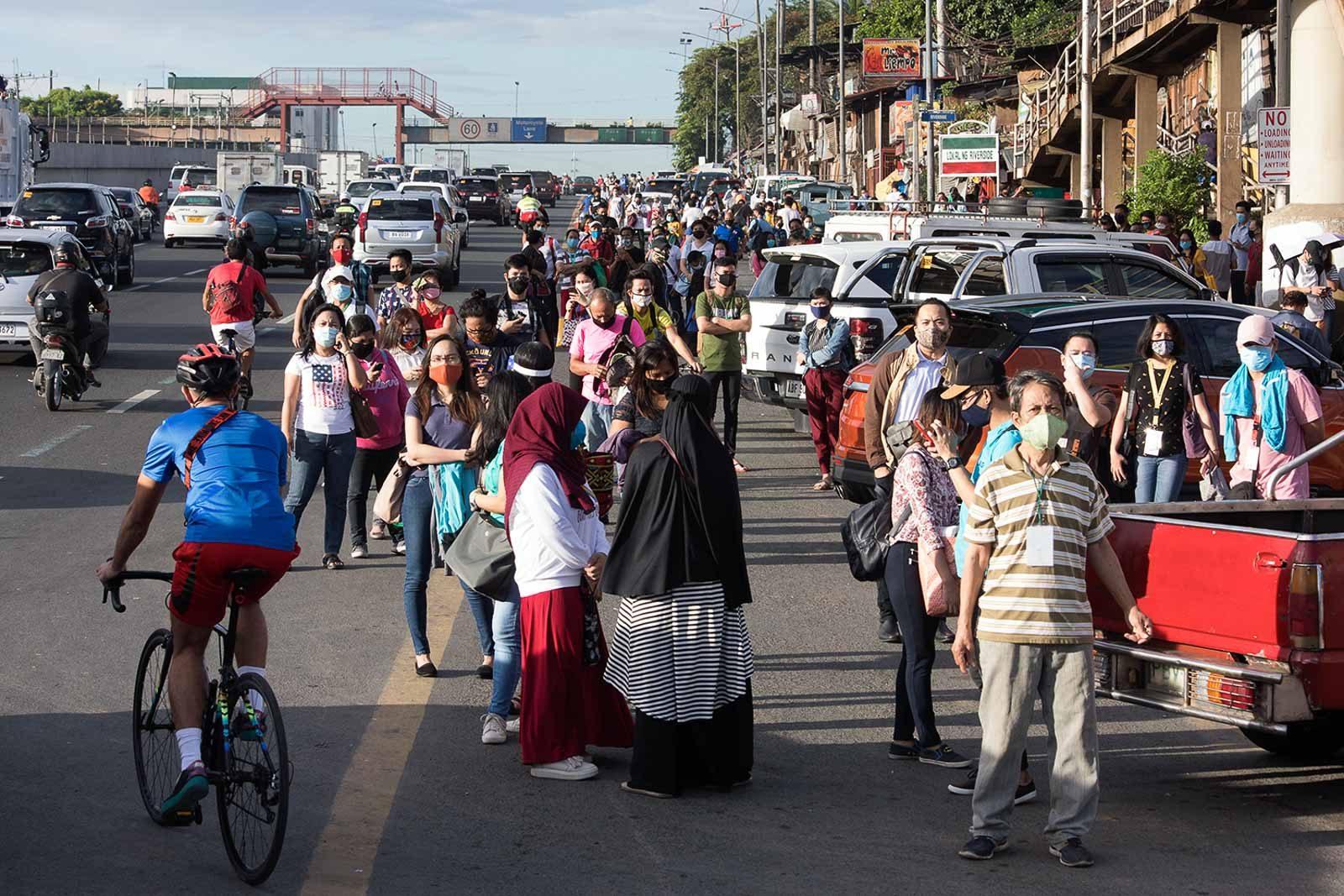SUMMARY
This is AI generated summarization, which may have errors. For context, always refer to the full article.

MANILA, Philippines – Senators on Tuesday, June 2, called out the Department of Transportation for “poor planning” and “lack of foresight,” as many commuters were stranded due to insufficient mass transportation when Metro Manila shifted to general community quarantine (GCQ).
The senators criticized the DOTr in separate statements a day after the start of the GCQ in Metro Manila, where many commuters found themselves stranded in the streets for hours, waiting for a ride home.
“The chaos and the hardship that our commuters had to endure yesterday was a result of poor planning. It shows the lack of foresight and the insensitivity of the government to the true need of the poor,” said Senate Minority Leader Franklin Drilon.
“The DOTr could have done better. It cannot go on like this. If we are to revive the economy, then we have make sure that our workers get to their work without compromising their health and that of others,” the minority leader added.
Senator Nancy Binay did not mince words in highlighting the suffering that commuters had to endure on the first day of GCQ.
“What happened to foresight? Mabuti sila’t aircon ang mga sasakyan. Eh kung subukan kaya ng mga opisyal ng DOTr mag-commute mula sa kani-kanilang bahay papasok sa opisina nila (sa Clark City o Ortigas)? Dapat maramdaman nila ang hirap na pinagdadaanan ng mga commuter. They won’t be able to plan well if they don’t feel and understand the people’s daily struggles,” Binay said.
(What happened to foresight? They’re fortunate that they have airconditioned vehicles. What if DOTr officials try to commute from their homes to their offices in Clark City or Ortigas? They should experience the commuters’ sufferings. They won’t be able to plan well if they don’t feel and understand the people’s daily struggles.)
As transport experts warned, there were not enough PUVs during the first day of GCQ in Metro Manila. Commuters had a manic Monday as they struggled to get to work with lack of transportation options. Some crowded inside military trucks and police vehicles, out of desperation to get a ride, while others hitched rides with private vehicles.
Some local governments have offered free rides, but only up to certain areas where their residents can get on another PUV to get to their places of work.
Binay said that the DOTr’s policy was “unrealistic, anti-commuter, and anti-worker.” (READ: On their own: Commuters and the looming transportation crisis in Metro Manila)
“Obviously, DOTr is favoring a certain segment of the mass transport sector, while ignoring and isolating the biggest public transport segment which the majority of the commuting public depend on,” Binay said.
‘Abandoned sector’
On Monday, the government allowed the limited operation only of train systems, bus augmentation, taxis, transport network vehicle services, shuttle services, and point-to-point buses.
The rest of the transport modes will come back June 22, save for traditional jeepney drivers and operators that still have to make sure that the vehicles are roadworthy and can implement health protocols.
Traditional jeepneys – the most-used mode of public transportation – were at the bottom of the “hierarchy” of transport modes to be allowed come GCQ, as the department pushed for PUV modernization.
“Healing is not abandoning one of the most vulnerable sectors that move people and economy. When you exclude the jeepneys from the equation, you also have abandoned 250,000 families – and their children are the ones who suffer the most,” Binay said.
Senator Joel Villanueva, meanwhile, pointed out that the government seemed to have forgotten that workers rely on public transportation.
“Our economy has been the prime consideration in the decision to relax our quarantine restriction, but sadly, it appears we forgot about the mobility of our workers in our desire to jumpstart the recovery,” Villanueva said.
“For industries to restart successfully, it relies on the labor of the people to spark the economic recovery,” he added.
A majority of industries were allowed to resume operations under GCQ. On Monday, Transportation Secretary Arthur Tugade had defended his department of critcism, saying that the DOTr “never promised” that sufficient public utility vehicles will come back come GCQ.
On Tuesday, Tugade appealed to businesses to provide shuttles for their workers. He also asked employers to implement alternative work arrangements to minimize the need to go to work.
Even during the modified enhanced community quarantine, the government had passed the transportation burden to the private sector.
The Employers Confederation of the Philippines had earlier said that only large businesses can provide shuttles, as 99% of establishments in the country are part of the micro, small, and medium enterprises. – Rappler.com
Add a comment
How does this make you feel?
There are no comments yet. Add your comment to start the conversation.